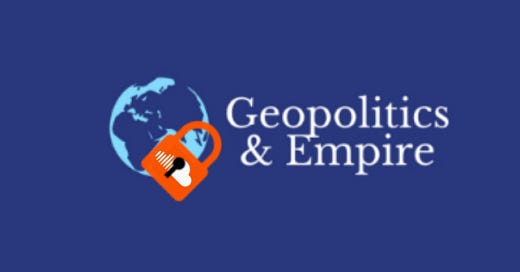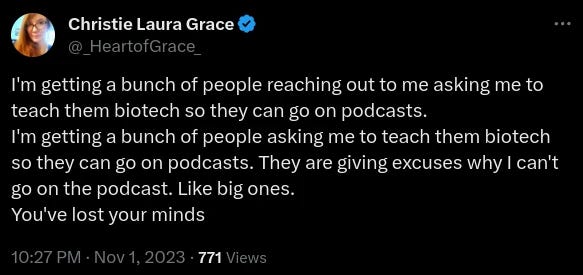SoundCloud Censors Geopolitics and Empire
Understanding corporate censorship, and what can be done about it
So I have been a loyal customer to Germany-based SoundCloud since 2015, where my podcast has been hosted…and now they have finally jumped on the censorship bandwagon…by deleting one of my interviews from a year ago. Are there any censorship-resistant podcast hosting providers left?
The censored interview: https://geopoliticsandempire.com/2023/02/14/christie-grace-big-pharma-wants-to-force-biologics-on-us
This particular interview being censored is very notable to me. I was disappointed to see that an episode of
was removed, but when I noticed which specific interview was removed it certainly raised an eyebrow. I’ve only had a passing awareness of ’s work, with much of it going over my head. The thing I find specifically concerning is that there is a pattern of those with substantially higher-effort investigative work being sidelined in favor of those who can meet the demand for simple and inflammatory rhetoric.When it first read her tweet I was stunned. Stunned that someone would have the audacity to demand a domain expert to coach them how to present ideas instead of… letting her speak to her expertise and answer questions. There’s undeniably a sexist angle to this, as such I also worry that this may be more common than one would expect. It’s a tragic mis-allocation of resources for those taking the time to actually put together potentially life-saving information to be maligned by those operating under the premise that it’s all just business. This makes it explicitly clear that what our governments and mega-corporations fear the most is ordinary people choosing for themselves who and what to platform, rather than allowing intermediaries to shape any and all discussions.
The Attention Economy is the Problem.
It’s really easy for someone to dunk on Hrvoje for using soundcloud. “You should be hosting it yourself silly! Right?” That sounds like useful information, but is naive at best and arrogant at worst in the face of infrastructure-level de-platforming. It is certainly possible for an individual to run a multimedia project as a passion project out of pocket, but the more hurdles that are thrown in the way, the fewer will actually manage to take part.
It may seem like an extreme position to some, but it is clear that the industry built around supporting media with advertisements is fundamentally malignant. A smaller industry would not be able to get away with infecting users with malware and operating as a 24/7 continuous data breach.
Data Shedding
This video is a summary of a report on how programmatic advertising can be weaponized for mass real-time surveillance. This report is highly troubling but not particularly surprising. If you want to …
We are NOT Powerless.
Blocking advertisements just makes sense, but to go even further we must explore more democratized and meritocratic ways of hosting, distributing, and sharing multimedia. The Free and Open Web is a beautiful thing, and despite many efforts to seize control over it we can still decide to reclaim territory in cyberspace and make our mark on history.
Understanding Podcast Hosting
Podcast hosting is a service that stores media files (either audio clips or video) and that allows for various podcast applications or apps to download and play media. Podcasting had its origin in RSS Feeds and sadly many “podcasts” stray from this open standard that really began a new independent media revolution. By allowing people to upload media for free, the platform seizes control over the content that is stored on it. If you’re lucky, the platform still publishes an RSS feed instead of relying on centralized indexing services.
A podcast itself is very simple. It’s a collection of video and/or audio files with a file that is machine-readable as in it’s very simple for a program to parse the information and use it as needed. A slimmed-down example of what this file would look like is this:
<rss version="2.0">
<channel>
<title>Example Podcast</title>
<link>https://example.com/podcast</link>
<item>
<title>Episode 1</title>
<link>https://example.com/podcast/episode-1</link>
<enclosure url="/episode.mp3" />
</item>
</channel>
</rss>
The file outlines the title and description for the show, as well as a link to where each audio/video clip is stored. Distilled down to this level, a podcast is quite similar to a static web site designed for a different kind of application interface. It’s pure data that can be stored in a large variety of ways. This means that any simple, inexpensive web hosting can be used to host a podcast. As the size of it grows, you may want to consider how you’re purchasing storage, and maybe using something like object storage can help you reduce costs.
Podcasting 2.0
By wholeheartedly embracing this, Adam Curry (aka “The Podfather”), co-creator of the podcast has started an exciting initiative called Podcasting 2.0. This initiative aims to expand the RSS format to include additional features that many “podcast” platforms refused to adopt. These features include donation links, chapters, and even transcripts. By expanding the RSS format with the “podcast namespace” Podcasting 2.0 allows for anyone to immediately take advantage of the latest and greatest features using open source software!
Sharing is Caring
Censorship resistance is only part of the story. It is down to all of us as individuals to take a proactive role in helping get the word out for independent voices that take the time to make room for conversations that need to happen. Censorship thrives as long as there is tolerance for it, making a deliberate choice to amplify those who are suppressed is a very effective way to counteract it.







Pray that Bill Binney has podcasts as part of the Panquake rollout.
The interview with Christie was from before I had found Hrvoje, so it got one more listen because of being censored. :)
I hope Christie will listen to some presentations by (and interviews of) Mark and Sam Bailey, Stefan Lanka, Andrew Kaufman, various ones on viruses at the Weston A. Price Foundation. And read The Contagion Myth. There are lots more people talking about viruses. If this issue could be dealt with, many other problems would be eliminated - getting to the root of the problems instead of hacking at the branches. The podcasts by the late David Crowe (The Infectious Myth) as well as his various websites are full of valuable information.